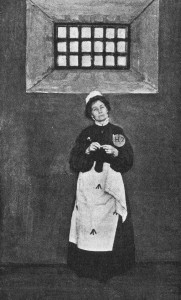Emmeline Pankhurst, the founder of the “Women’s Social and Political Union,” was an integral contributor to the women’s suffrage movement in Britain. Born in Manchester to politically active parents, Pankhurst was introduced to the suffrage movement at a young age. She subsequently married Richard Pankhurst, a supporter of women’s suffrage who supported her activist work. In her 1913 writing “Militant Suffragist,” Pankhurst asserts that the suffrage movement in England, unlike its counterpart in the United States, had progressed past the state of advocacy into a revolutionary and civil war. ((Emmeline Pankhurst, Militant Suffragist, 1913)) The text was authored in the midst of the WPSU’s energized campaigning. The group condoned destruction of property and even arson as tactics to achieve suffrage, staying true to the title of “militant.” The use of such approaches explains Pankhurst’s self-conceptualization as a soldier rather than simply an activist. Part of her duty as a soldier fighting for liberty was a willingness to die for her cause; Pankhurst states that her group forced the government to accept that “either women are to be killed or women are to have the vote.” Her impassioned writing aimed at converting men to her cause. She beseeched men in the United States specifically to consider whether they would rather kill women they respected than give them equal citizenship. ((Emmeline Pankhurst, Militant Suffragist, 1913))

Pankhurst during her first prison sentence in 1908. She was imprisoned for “obstruction” after attempting to give a document of protest to the Prime Minister.
Pankhurst represented a significant shift away from the glorification of middle class “virtues” prevalent in the Victorian Era. During the nineteenth century, female authors such as Elizabeth Poole Sanford and “Mrs. Beeton” authored self-help works instructing women to be contented with their inferior position and avoid leaving their domestic sphere. Pankhurst’s text was the antithesis to the concept that a woman should live to please her husband, an idea which bred anti-suffragist concerns about a man simply deciding for whom his wife would vote. Victorian middle class values were largely an illusion, only attainable by the wealthy and perpetuated by those it subjugated. Pankhurst aided in the eventually successful fight for women’s suffrage, accounting for the partial destruction of values oppressive to women. In thinking about the dramatic differences between the writings and lives of the two Victorian authors versus Pankhurst, I would ask what major social, cultural, or economic factors may have influenced the divide.
Picture from: https://upload.wikimedia.org/wikipedia/commons/0/0c/Emmeline_Pankhurst_in_prison.jpg

